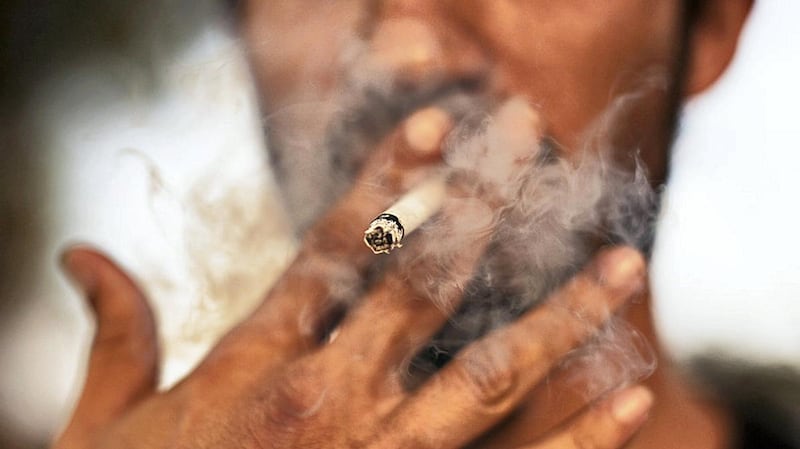One year on from the UAE’s landmark 100 per cent tobacco tax, half the smoking population is believed to have turned to cheaper, illicit cigarettes.
Middle East experts in the black market trade claim half the UAE cigarette industry is now taken up by ‘cheap whites’ or lower quality cigarettes.
Many are either manufactured in the UAE’s free zones or smuggled in to avoid government regulations and excise duties.
There are 77 tobacco related operations in Dubai free trade zones, including 22 manufacturers of cheap whites.
“There is not a lot of regulations in these free zone areas, such as the standard of paper used or quality of tobacco,” said industry investigator Brendan Lemoult, who is vice president of global compliance and anti-illicit trade training at Japan Tobacco International.
“Free zones are either not declaring a market, or being deceptive about where these cigarettes are destined for.
“Any free zone is attractive to criminality as there is less regulation.”
Mr Lemoult was speaking at the third global illicit trade summit hosted by The Economist in Abu Dhabi on Tuesday.
The Gulf Research Centre think tank compiled a report on the region’s illicit tobacco trade this year to assess the effect of the tobacco tax implemented across the GCC in 2017.
Details of the study included research on the trade’s effect on national security, organised crime, societal issues and the region’s legitimate economy.
The report said smugglers were taking advantage of simplified customs procedures and lack of governance to disguise the origin and nature of products by mis-declaring goods, declaring goods in transit and manipulating accompanying documents.
“Manufacturing facilities in the UAE free zones are producing cheap whites without the packaging health information that 98 per cent of countries have,” said Tamer Shabana, director Illicit Trade Prevention at Philip Morris Middle East, an American multinational cigarette and tobacco manufacturing company.
“We do our own research to measure the penetration of illicit products, counterfeit cigarettes illegally imported tobacco from other countries.
“We also complete empty packet surveys to see what cigarettes are being smoked, and we know illicit whites now cover 50 per cent of the UAE market.”
Free trade zones are duty free areas offering warehousing and distribution facilities for trade, trans-shipment, and reporting operations, generally organized around major seaports, international airports, and national factories.
The UAE has one of the region’s largest free trade zones.
A new scheme to add digital stamps to cigarettes is part of a government crackdown on tax evasion within the tobacco industry, and will target the illicit tobacco industry.
It is hoped the measure will help prevent illegally smuggled tobacco, such as cheap whites, that account for around 30 per cent of sales in the country.
“We have seen tobacco products exported out of free zones and declared for importation in a third country elsewhere in the Eastern European Union,” said Mr Lamoult.
“One truck can contain 10 million cigarettes so the value can be somewhere between $2-5 million per container.
“If smugglers have 10 containers they want to ship to areas of high taxation, such as they UK, they only need to get one through to make a big profit.
“This is the risk of high taxation in some countries, and some free zones are helping facilitate that industry.”
_________________
Read more:
UAE records high compliance with tobacco and fizzy drinks tax
UAE considering lifting ban on e-cigarettes
Alarmingly high levels of nicotine and tar found in medwakh, UAE study shows
__________________
The Organisation for Economic Co-operation and Development is in the process of developing new guidelines for free zones to improve transparency and accountability.
It is pushing for a certification programme for businesses operating within free zones that is recognised worldwide.
Businesses should have to meet a certain threshold to achieve that certification.
“When some trade passes through free trade zones, criminal operations are using the lack of regulatory enforcement to launder money,” said Stuart Patterson, a partner at law firm Herbert Smith Freehills in Dubai International Financial Centre.
“Free trade can be incentivised by good governance to help combat illicit trade.
“Governments are often benefitting by not enforcing regulations on trade passing through free zones around the world.”
Mr Patterson said adequate laws in the UAE are in place, but like many free zones, are not always adequately enforced.
Greater physical access to free zone operations for scrutiny checks and a greater reporting of suspicious financial transactions would also help tighten up these areas, he said.
The Financial Action Task Force, backed by the G7 group of biggest global economies, conducts evaluations of countries to assess money laundering vulnerabilities.
The UAE is due for an inspection for anti-money laundering compliance in 2019.
“When trade passes through free zones, fees are paid and those fees are effectively proceeds of crime that are effectively then invested back into the legitimate economy,” Mr Patterson said.
“How you combat this is difficult, but these areas can be subject to greater transparency and accountability.”







